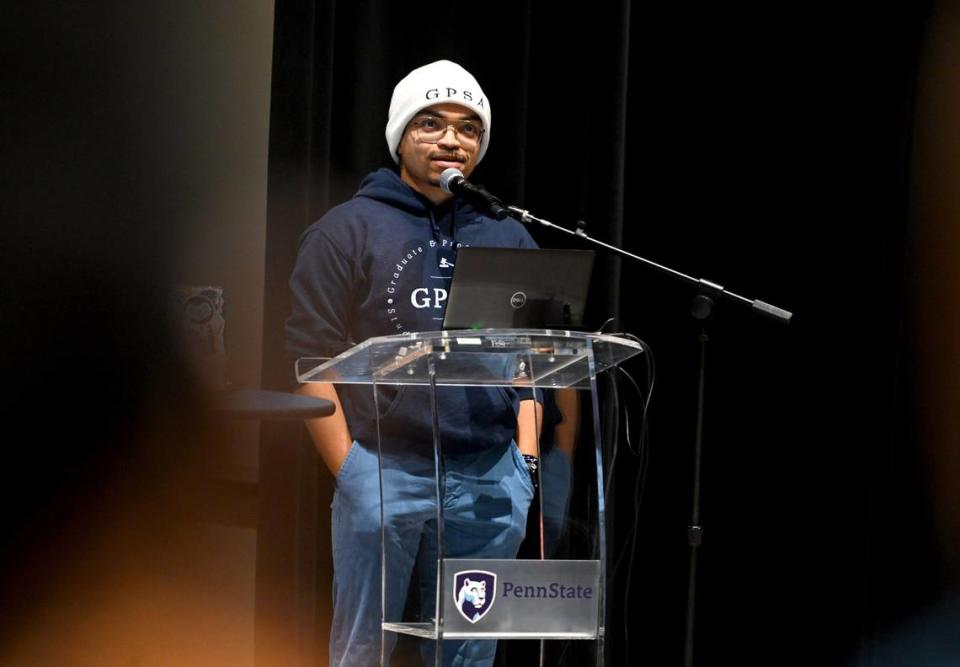Penn State faculty host third teach-in on racial justice in 3 semesters. Has anything changed?
The crowd of students and faculty members grew hushed Thursday afternoon inside Penn State’s Flex Theater. Sniffles echoed throughout the auditorium housed in the HUB-Robeson Center.
Here, during a racial justice teach-in organized by the faculty senate’s Racial Justice Caucus, some audience members leaned forward as a speaker from Penn State Brandywine read the words from a colleague, a member of the LGBTQ+ community, who wasn’t able to stomach the discrimination while at Penn State. In one instance, the colleague heard a fellow faculty member degrade the “over-sexed queers.”
“When I began my sabbatical in fall 2017, my plan was to kill myself at the end of it in 2018,” the colleague wrote in a March 2020 blog post, read aloud by Marinda K. Harrell-Levy, an associate professor at Brandywine. “I did not want to die, but at the time I could see no other way to escape Brandywine.”
The colleague eventually reconsidered — but knew she couldn’t remain there.
“It would appear that (Tom) Stoppard was right and that ‘blood is compulsory,’” she wrote. “In lieu of myself, I must shoot my career in the head.” She resigned, despite her status as a tenured professor.
More than 180 people listened to Harrell-Levy and several other speakers address unheard minority voices and lingering university problems during Thursday’s teach-in. It was simultaneously broadcast over Zoom and in-person on the HUB’s first floor, with more than 150 online and about 30 in-person.
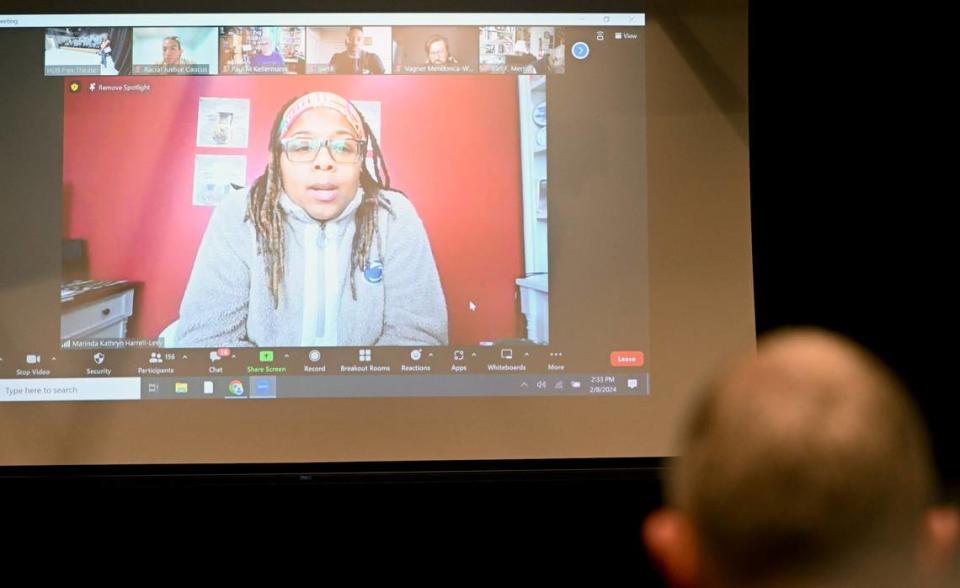
This was the third racial justice teach-in in three semesters and, while organizers couldn’t guarantee there would be another next semester, they promised these teach-ins wouldn’t stop. After all, they began when a group of faculty members felt their concerns on diversity, equity and inclusion went unheard and ignored.
And that feeling hasn’t changed.
Julio Palma, an associate professor of chemistry at Penn State Fayette, helped moderate the event from Zoom and opened by summarizing how they got to this point — how university President Neeli Bendapudi canceled the Center for Racial Justice, how the administration organized a large police presence for a protest against a hate group leader, how promises for more diversity and more equity have seemingly led to more words than action.
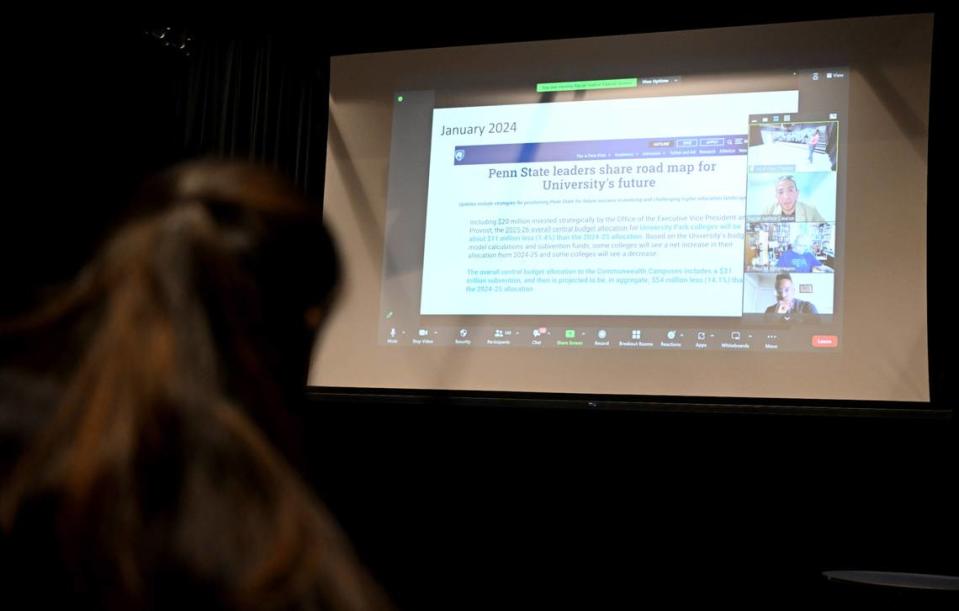
Harrell-Levy succinctly summed up the reason for her participation, and so many others’.
“I love Penn State,” she said. “And I would love for Penn State to stop breaking my heart.”
Harrell-Levy, a co-author of two detailed reports outlining Penn State’s racial problems, knows the issue better than most. Her research and surveys found that 8 in 10 Black professors reported experiencing racism at Penn State, and more than 1 in 3 respondents at least “sometimes” regretted joining the university. According to the university’s own data, the number of Black tenure-line faculty is also at its lowest mark in at least five years. (There are 101 such professors now, compared to 118 in 2021.)
Thursday’s racial justice teach-in wasn’t limited to simply the African American community. The theater was a melting pot of people, from faculty members in suits to students in hoodies, and the focus remained on marginalized people and their role at Penn State. Specifically, this teach-in was focused on racial justice with the budget crisis — and nearly $100 million in planned cuts in 2025-26 — and was titled, “Budget crisis at Penn State? It’s a moral crisis.”
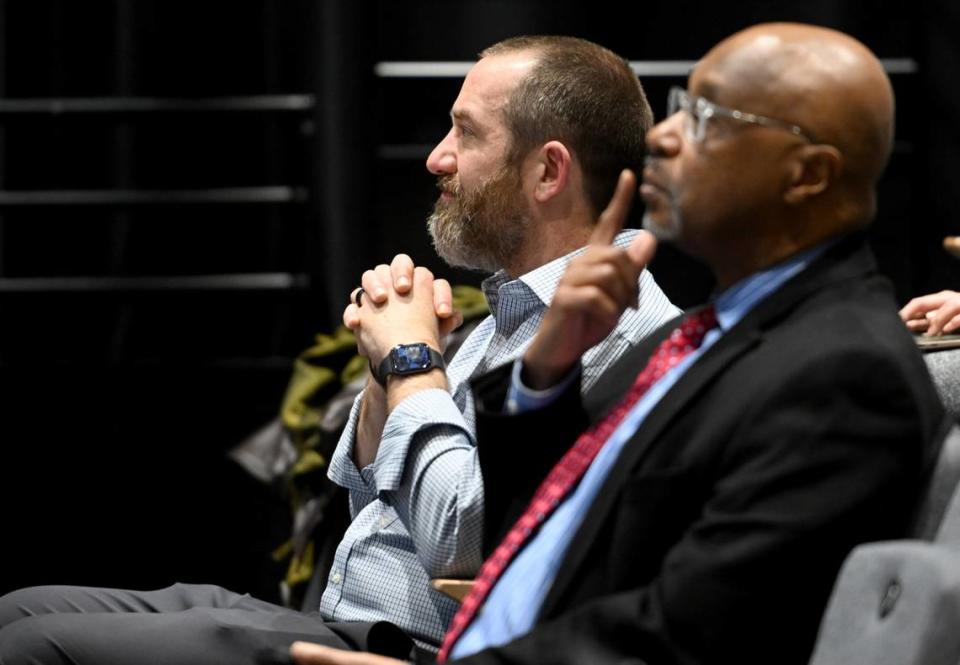
“This teach-in was really focused on the budget projection for the 2025-26 academic year and what impact that’s continuing to have in de-prioritizing minoritized populations at the university,” said Beth Seymour, a teaching professor from Penn State Altoona who helped moderate from the theater. “Because when you make budget decisions like that, they’re most likely to heavily impact the most vulnerable populations.”
In other words, Penn State may say it’s committed to diversity, equity, inclusion and belonging. But will the 2025-26 budget bear that out? “Show me the money,” half-joked Michael West, who last year resigned as the head of the African American studies department, after what he said were broken promises.
Speaker after speaker shared personal stories that reinforced their belief Penn State needed to do better. A law school student from the state of Florida said he was warned about racism here before enrolling. Harrell-Levy recounted a story from one colleague, who was unsuccessful in stopping a welcome-back luau at Brandywine that some felt was akin to redface. (A link to Facebook photos of the event no longer works.) And Palma acknowledged some Penn State campuses don’t have a single Black or international professor.
“We teach white students that come from rural America that have gone from K through 12 without a single Black teacher, international teacher,” Palma said. “And they come to a Penn State campus, and that’s our opportunity to expose them to multiculturalism, to expose them to diversity.
“On my campus, Penn State Fayette, students can come from the local schools, graduate with a Penn State degree in criminal justice and never have a single Black faculty, African American faculty.”
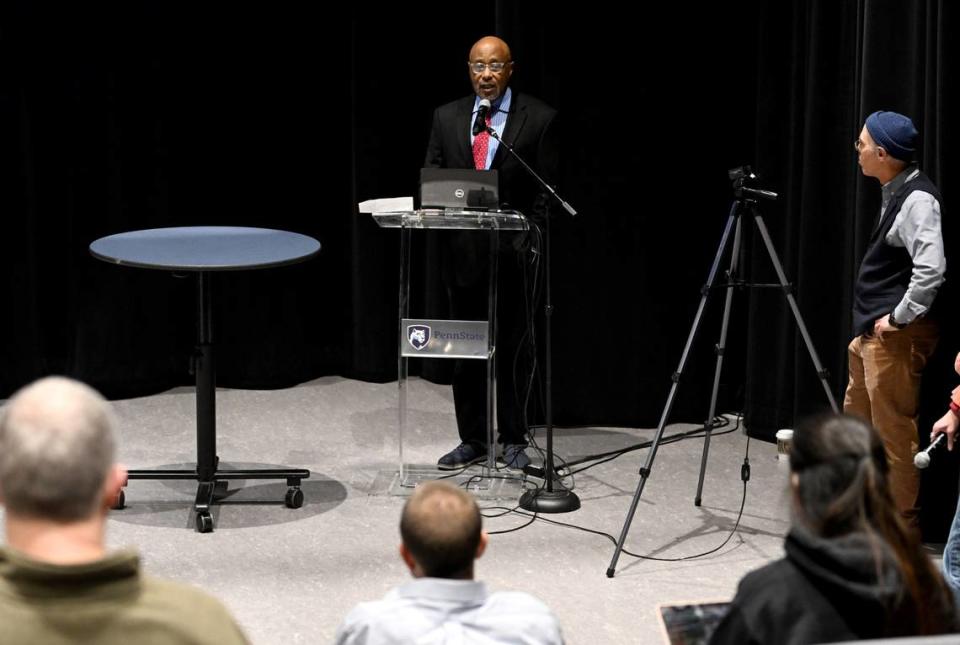
On the same day as the teach-in, Penn State issued an 1,800-word news release on “faculty and staff hiring efforts moving forward.” The university touted its future commitment, making note of an upcoming faculty hiring program focused on diversity and an “enhanced” way to report bias. Some excerpts of the release were read aloud at the teach-in, with scattered giggles when referring to Penn State’s “DEIB agile teams.”
But, until Penn State’s current plans turn to concrete results, organizers are intent on continuing to raise awareness on the issues. Thursday’s event was nearly twice as large as the last one, in October, and was co-sponsored by the University Faculty Senate and the Diversity and Community Enhancement Committee.
Speakers called on allies for help. Johnathan White, an associate teaching professor at Penn State Greater Allegheny, paraphrased Martin Luther King Jr. while addressing the topic. He referred to King’s final speech, “I’ve been to the Mountaintop.”
“Too often in America, we say to ourselves, ‘What’s going to happen to me if I try to help them? What’s going to happen to me if I try to help them?’” he repeated.
“And we don’t ask ourselves, ‘What would happen to them if I don’t?’”
